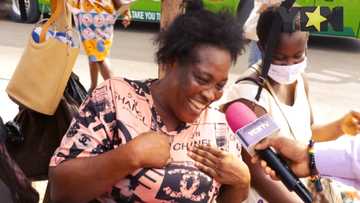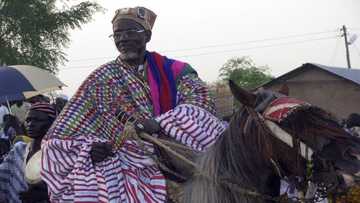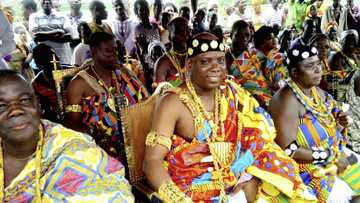Ga-Adangbe tribe: language, traditional wear, dances, food, religion
Ghana is among the West African countries with rich traditions and cultures. It has a tradition of viewing time as a sequence of events instead of minutes and hours. Generally, people take life at a relaxed pace. There are several ethnic groups in Ghana with unique traditions. Ga-Adangbe tribe is one of the ethnic groups with vibrant culture.
PAY ATTENTION: Click “See First” under the “Following” tab to see YEN.com.gh News on your News Feed!

Source: Twitter
The Ga-Adangbe or Ga Adangme people are usually grouped as part of the Ga-Dangme ethnolinguistic groups of Ghana, Benin, and Togo. They mainly live in the Greater Accra region. Dangme is the language that is most used in the Greater Accra Plains. On the other hand, Ga has occupied the towns around Tema and Accra.
Origin of Ga-Adangbe
The Ga-Adangbe people came from a city in Egypt called Goshen. The group stayed there for some years before leaving during 672-525 B.C. The migration route of Ga-Adangbe saw them across Ethiopia and then down to Nigeria. They later migrated to West Africa and eventually stopped in Ghana, becoming their permanent home.
According to historians, the mighty leader, King Ayi Kushi (Cush), who led the Ga-Adangbe tribe during this period, lived between 1483 and 1519. Ga includes Ga-Mashie and Ga speakers, who migrated from Akwapim, Anecho in Togo, Akwamu, and the surrounding areas. After settling in West Africa, Ga and Adangbe were highly influenced by their neighbours.
Enjoy reading our stories? Join YEN.com.gh's Telegram channel for more!
They even borrowed some of the vocabularies from Guan, particularly the words relating to statecraft and economic activities. Also, other tribes such as the Ewe are believed to have influenced the Adangbe.
Ga-Adangbe tribe's cultural aspects
What is the culture of the Ga-Adangbe tribe? The Ga-Adangbe people have a unique culture with many traditional economic and social benefits, which is still observed to date.
Their children learn about this culture as they grow and are expected to stick to it regardless of their status in the future. Here is how they view different cultural aspects:
Religion
The Ga people have many cultural beliefs related to Shamanism and Christianity. Shamanism was their first belief when they worshipped their ancestors and gods. Their original religion is associated with a spirit called ordzemawon.

Source: Twitter
Abomsam is known to be the head of all evil spirits. Some of these spirits are associated with unique places. They are known to change their shapes at their will at any time. Priests can either be male or be female. The female spirit mediums usually communicate with their voices, unlike in the case of male mediums.
However, some Ga people became Christians after being introduced to them in 1835 by Joseph Rhodes, a Christian missioner who lived near them, while others have also become Muslims.
Festivals and celebrations
At the beginning of every year, these people plant and grow crops to prepare for the Homowo festivals. The festival means hooting for hunger. They believe that they did not have any crops left in the past centuries due to the inadequate seasonal rains that made the people experience severe hunger. Therefore, this festival is celebrated to overcome starvation.
There are other celebrations and festivals that these people have to prepare for every year. For example, from the last week of July to the first weekend of August, they have a celebration called Asafotu or Asafotufiami. This is for the deceased victors who fought on the battlefield for the Ga people to be where they are today.
Music and arts
There are many preparations for dances and music that these people make. They usually make carved stools, jewellery, richly woven cloth, brass gold weights, and gold aircraft.
Rites of passage
The rites of passage events for boys and girls in the Ga-Adangbe tribe are not conducted in the same way. There are many rules and regulations that girls pass through during this period compared to boys. At puberty, the girls go through a training called Dipo, which is known to be the formal rite of passage. The event takes place every April.
The girls shave their hair and wear short clothing up their knees on the first day. Then, they march around the neighbourhood on parade.
The following day in the morning, the chief bathes them using the blood of goats as a sign of dealing with an evil spirit that might make them incapable of reproducing. Then they are made to sit on the sacred stone to check if they are virgins.

Source: Twitter
The girls found not to be virgins or impregnated by a community member cannot get a man from the tribe. After successfully passing all these tests, they are taught by ritual mothers how to give birth, nature, housekeeping, cleaning, seduce, and treat their husbands well.
They are also taught how to dance Klama dance. The dance takes place on the last day of the whole rite process. The girls who have transitioned into womanhood are well dressed in beautiful kente clothing and accessories during the last day. Then, any man interested in one of the girls can start talking to the girl's family.
What language does the Ga Adangbe speak?
They speak in the Gbe language. But then, although there are different Gbe languages, the common one is the Ewe. Other dialects available are Fon, Gen or Mina or Phla-Phera, and Aja.
Ga symbols
Like any other African tribe, the Ga-Adangbe tribe has hundreds of symbols with deep meanings and specific messages. They are also used to enforce particular virtues. Yet, the Ga symbols are held by some of the community elders. These symbols are considered sacred, and not everybody is allowed to view them.
Ga staple food
Ga women are highly skilled in preparing different foods and making beer using various natural items. The activities require a lot of knowledge and are labour-intensive.
Needful to note also is that Ga women have been traders since the sixteenth century. Since then, they sell agricultural produce. They mainly sell fish, maize, beer, and even prepared foods. However, their staple food was, and is still, Komi or Kenkey, made up of fermented steam corn dough.
Ga-Adangbe traditional wear
They have a unique traditional kente cloth worn on special occasions. In the early days, they wore this cloth for happy occasions only. But in the modern days, the clothing is usually worn for almost every occasion, including religious worships, rites of passage, funerals, and weddings.
The Ga women also make accessories using beads, gold, and wood and then wear them during these important occasions.
Sporting activities
The Ga-Adangbe tribe's culture is also reflected in their sportsmanship spirit. They compete in sports like football, basketball, handball and lawn tennis, as witnessed in the Ga Adangbe Youth Sports Festival and Tourism launched in 2019 in Accra, Ghana.
Funerals and the symbolic use of fantasy coffins
One of the most curious aspects of this tribe's culture is their elaborate and colourful celebration of the death of a relative. It does not matter whether the deceased's family is impoverished; they must ensure that their departed is ushered from the physical realm to the ancestor's realm with fanfare.

Source: Twitter
One of the reasons for this is the belief by the Ga people that the dead are powerful and can be benevolent or disastrous, depending on how you treat them in death. There are many foods and drinks, and everyone comes in their choicest attires, even though burials are supposed to be filled with sadness and long faces.
One of the most critical aspects of the funeral of a deceased member of the Ga-Adangbe tribe is the use of symbolic coffins that tells the stories of the departed. For example, the coffin's shape used to bury a person in this culture could tell of their profession and social status.
A wise man will most likely be buried in a coffin-shaped like an antelope, while a dead fisherman (the predominant occupation of the Ga people) will mostly be sent to the ancestral realm in a fish-shaped coffin.
Animal-shaped coffins often represent the totem of the deceased clan. Nevertheless, it is mandatory for any family who wants their deceased to be buried by the church to ensure that their designer knows how to create a bible-shaped coffin.
FAQs
Several questions have been asked about the Ga-Adangbe people. Nevertheless, the common ones and answers given include the following:
- What is the traditional dance of Ga-Adangbe? According to some sources, Kpatsa or Kpanlogo is what these folks call their dance. They make carved stools, jewellery, richly woven cloth, brass gold weights, and gold aircraft.
- How do Ga's call God? Ataa-Naa Nyonmo is the name of their god. They believe that this god is a supreme spirit that created the world and has male and female features.
- Is Ga a tribe in Ghana? Yes, it is, and it goes by several names in the country. Some of them include Ga-Dangme, GaDangme, Ga-Adampa, Ga-Adangme, Ga-Danmeli, Ga-Adampe, Ga-Adangbe, Ga-Adanme, and Ga-Ada.
- Where do the Ga-Adangbe come from? They came from Goshen in Egypt. Initially, they went to Nigeria through Ethiopia before settling in Ghana.
- What language does the Ga-Adangbe tribe speak? They speak the Kwa Ga and Dangm languages.
- What is the traditional food of the Ga? Komi or Kenkey are their stable food. They also eat and sell fish, maize, and beer.
The Ga-Adangbe tribe is one of the ethnic groups from West Africa well known for its vibrant culture. These people take their culture seriously and do everything set in place by their forefathers. Among other things, they still observe how to dress during occasions and the types of food to eat.
Yen.com.gh also discussed how Christians celebrate Easter in Ghana.
According to the post, some people begin their celebration on Good Friday. The significance of the celebration is to commemorate Jesus's triumphant entry into Jerusalem. Find out more from the post.
Our manifesto: This is what YEN.com.gh believes in
Source: YEN.com.gh

Favour Adeaga (SEO author) Favour is an author, speaker, and coach. He graduated with a degree in Mass Communication from The Polytechnic, Ibadan, Nigeria, in 2011. He had his internship programme at The Nation Newspaper and taught diploma students in Newspaper and Magazine course at the Nasarawa State University, Keffi. He curates the facts and life hacks category since 2018. Favour is the author of two books available on Amazon. He currently lives in Nigeria. favouradeaga@gmail.com

Chris Ndetei (Lifestyle writer) Christopher Ndetei is a junior reporter writer who joined the Yen team in May 2021. He graduated from the Machakos Technical College in 2009 with a diploma in ICT. Chris has over two years of experience in content creation and more than ten working in the hospitality industry. He covers lifestyle/entertainment, focusing on biographies, life hacks, gaming and guides. In 2023, Christopher finished the AFP course on Digital Investigation Techniques. You can reach him at chrisndetei@gmail.com









